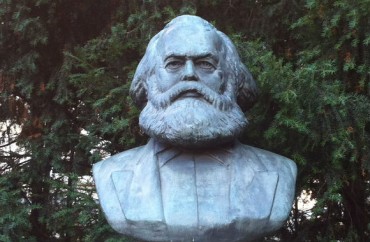
‘Exploitation, domination and irrationality’
A class at University of Wisconsin-Madison studies how capitalism “generates harms” and “is irrational in ways that hurt nearly everyone,” according to a copy of the syllabus recently obtained through a public records act request by the MacIver Institute.
Berkeley-born and educated sociologist Dr. Erik Olin Wright, who teaches the graduate student course called “Class, State, and Ideology: An Introduction to Social Science in the Marxist Tradition,” goes on to instruct students on how to challenge capitalism.
Capitalism is an oppressive system, according to the syllabus, and “should therefore be criticized from the point of view of the interests it harms — especially the interests of the working class, but also other social categories whose interests are harmed.”
The course explores the “full range of harms and forms of injustice associated with capitalism. These critiques can be broadly grouped under three rubrics: exploitation, domination, and irrationality,” it states.
 Mere critique is not the end goal of this course, however, but societal and institutional transformation. Its purpose, according to the nearly 80-page syllabus, is to teach Marxism as an “emancipatory social science,” that is to “fulfill the goal of generating critical social scientific knowledge relevant to the task of challenging systems of oppression.”
Mere critique is not the end goal of this course, however, but societal and institutional transformation. Its purpose, according to the nearly 80-page syllabus, is to teach Marxism as an “emancipatory social science,” that is to “fulfill the goal of generating critical social scientific knowledge relevant to the task of challenging systems of oppression.”
“Ultimately the point of Marxist social science is to generate theoretical knowledge relevant to the practical task of transforming the world in ways that increase the possibility of human emancipation,” the syllabus reads.
Though the end goal of “human emancipation” is not specifically delineated, Dr. Wright assigns his own work, Envisioning Real Utopias, for this section of the course. He also plans an end of term retreat weekend in Upham Woods featuring academic sessions on “Real Utopias,” complete with a gourmet potluck.
A 2012 bio on Wright by the American Sociology Association states that “real utopias,” according to the scholar, include “participatory budgeting in Porto Alegre, Brazil; the production cooperatives of Mondragon, Spain; and even the collective self-organization of Wikipedia.”
As for the syllabus, nowhere does it offer the opposing view that capitalism is beneficial.
Though there is a section titled “American Exceptionalism,” the syllabus does not use this term in its traditionally positive sense, but rather subverts it, arguing that “the U.S. working class is unique, or ‘exceptional,’ in never having even formed durable electoral vehicles of its own to wage policy struggles in the state.”
UW student Jessica Murphy highlighted this course in a research piece published by the free-market MacIver Institute, drawing criticism for her efforts.
 Murphy ranked Wright’s course No. 1 in a list of “wasteful” classes in the UW system, writing “this one-sided account of capitalism seems to ignore all of the benefits reaped throughout centuries thanks to capitalism and the free market…the students sit in class with their laptops open, with a textbook they bought from Amazon on the desk in front of them, holding a Starbucks coffee in one hand and an iPhone in the other. Maybe the irony is lost on them?”
Murphy ranked Wright’s course No. 1 in a list of “wasteful” classes in the UW system, writing “this one-sided account of capitalism seems to ignore all of the benefits reaped throughout centuries thanks to capitalism and the free market…the students sit in class with their laptops open, with a textbook they bought from Amazon on the desk in front of them, holding a Starbucks coffee in one hand and an iPhone in the other. Maybe the irony is lost on them?”
“Wright argues that the free market causes people to suffer for no fault of their own, when in reality it causes people to flourish,” Murphy notes. “Capitalism has saved and improved millions of lives through the innovation of products and services such as solar powered food dehydrators, water purification straws, refrigerators, penicillin, airplanes, and Uber. What are the chances these successes are accredited to capitalism in this course? My bet is slim to none.”
Asked to weigh in on the criticism, Wright responded in an email to The College Fix that “I believe that academic courses that explore rigorously the ideas in important traditions of social thought are of great value to students regardless of a student’s specific political orientation. In this course, my goal is for students to understand in a sophisticated way the concepts, theories and arguments in the Marxist tradition; I never insist that students agree with those arguments.”
Wright’s bio on the association website states that “legions of graduate students have passed through his courses on Marxist social science, theories of the state and economic sociology. Whether they agreed or disagreed with what he had to say, they received an unforgettable education in thinking, writing, and reading that they carried with them to universities all over the globe.”
Director of UW media relations Meredith McGlone echoed Wright’s comments via email to The Fix.
“UW-Madison offers courses on capitalism, Marxism and other significant socioeconomic theories that have shaped global politics, economics and history. Professors encourage students to think critically about these concepts and engage in rigorous debate,” she said.
“The writer of the article [Murphy] appears to have mistaken teaching about these concepts for requiring students to adopt particular political beliefs, which is not part of the coursework here,” McGlone said.
The University of Wisconsin Madison course is not the only of its kind, however.
In the past, an “activism” class at the University of Michigan assigned a textbook that argued capitalism should be “overthrown.” Moreover, a 2013 survey of 31 public and private institutions found that often schools either criticize or ignore capitalism in economics courses, or fail to teach it objectively.
MORE: Raised By Commies, Now He Teaches Capitalism To American College Students
Like The College Fix on Facebook / Follow us on Twitter




Please join the conversation about our stories on Facebook, Twitter, Instagram, Reddit, MeWe, Rumble, Gab, Minds and Gettr.